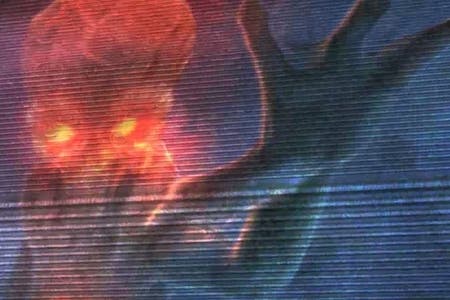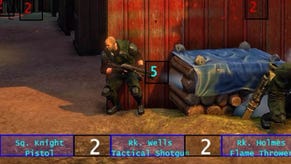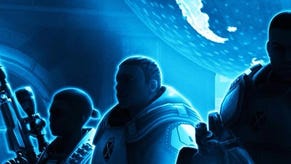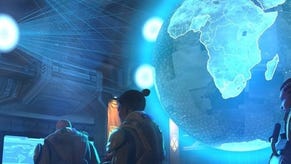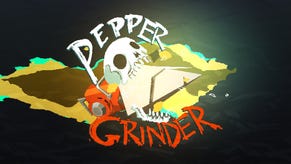XCOM: Enemy Unknown review
They don't come in peace.
Buy XCOM, it's a belter. I know it's Big Game season, but this is so good I've chalked up 43 hours in four days and want more in the near future. XCOM absorbs you into a universe of Tonka toy soldiers and B-movie science-fiction, a rich and smartly streamlined strategy experience that's a hell of a credit to the design of the 1994 original. Re-imagining? Remake? Whatever it is, XCOM brings back and revitalises a classic.
You play as the Commander of the eponymous task force set up to defend Earth from a new extraterrestrial threat, responsible for both the organisation's overall management and directing the ground battles. This combination of genres is unusual even 18 years later, but works because of the multiple ways the two worlds intersect - the most obvious and irresistible through-line being how the XCOM troops evolve over time, from standard-issue grunts to plasma-wielding psychic warriors in cloaking suits, depending on how research and manufacturing are juggled.
The base management owes much to the original X-Com, but also to Kojima Productions' masterful Metal Gear Solid: Peace Walker and its Mother Base. The surface sheen is a gorgeous, zoomable 3D map of the facilities you've built, which whooshes into and out of rooms as you burrow into the nested menus - studying recovered alien technology, expanding XCOM's global coverage and training up an army. There are always new things to fiddle with and read and choices to be made.
Particularly when there's contact. Running XCOM is about balancing budgets, but also nations; if there are three attacks in different parts of the globe, you can only respond to one. Successfully completing missions lowers the panic level, but only in that country. The ones left to fend for themselves move closer to mass panic, and if a threshold is reached will permanently abandon XCOM. It's relatively easy to keep nations happy on Normal difficulty, unless you fail missions repeatedly, but on Classic it's a whole other matter. Which nations can XCOM not afford to lose? With 'Ironman' mode activated, which ties a game to a single autosave, I guarantee you'll find out.
"Re-imagining? Remake? Whatever it is, XCOM brings back and revitalises a classic."
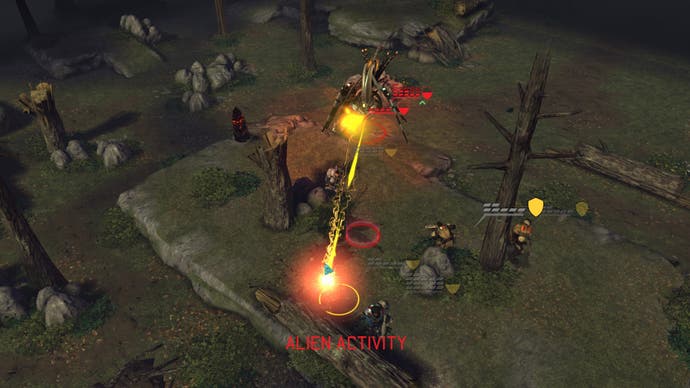
The campaign is structured around responding to semi-random alien alerts - which may involve countering an abduction attempt, investigating a crash site, disarming bombs or rescuing VIPs. But the general rule is kill the aliens. The turn-based battles are XCOM's real meat, its 3D environments viewed primarily from an isometric perspective but jazzed up considerably by zoomed-in combat targeting reminiscent of Fallout 3's VATS mode. The drama cam also toggles when troops are dashing to cover or a new cluster of enemies is spotted, and even though it's an illusion, it gives a coat of dynamism to the piecemeal strategising.
Levels draw from a fixed map pool, with plenty of variation in the layouts and cover opportunities, but what keeps them fresh is the randomised enemy placement. The invasion force can be anywhere, on any mission.
XCOM's aliens are an ever-expanding grotesquerie of bulbous heads and B-movie nightmares and operate in groups with particular styles of combat. Sectoids, the earliest opponents, are pathetic individually but in large clusters can buff each other and overwhelm standoffish assaults. The Berserkers will charge straight for anyone shooting them, breaking out of the turn-based pattern and forcing an immediate takedown (or messy consequences). Others will flank you by air, unleash devastating one-shot laser barrages or eviscerate a squad member and implant their still-twitching corpse with an egg.
"Capable of annihilating lone units and pouncing on bad positions, the aliens are at their most terrifying when you can't see them."
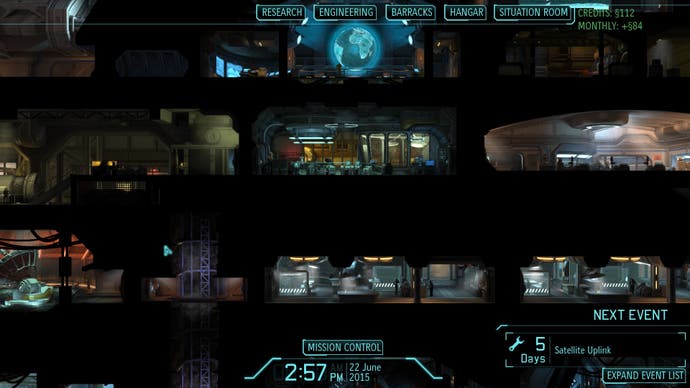
The characteristic they share, in other words, is an ability to kill XCOM operatives very quickly. Taking fire of any kind is always a bad thing, and what makes the aliens so scary is how effectively they identify exposed units - or that one super-unit your entire strategy depends upon. What gets you killed in XCOM is failing to check a corner, or moving too far forwards, or taking a risk and failing to make the shot. The fog of war shows general shapes like cars or walls, but mistaking that for a licence to move in is a sure way to the grave. Movement has to be slow, measured, covering every angle with the 'Overwatch' ability to catch enemies bursting from cover. Capable of annihilating lone units and pouncing on bad positions, the aliens are at their most terrifying when you can't see them.
This sense of tension is manifested in the fact that troops can panic; a 'Will' stat shows how strong-minded each individual is and under extreme pressure anyone can crack. When a soldier panics, he or she performs a random action (which may include shooting an enemy or team-mate) and misses a turn.
I was once assaulting the control room of a crashed UFO. Two assault troopers, two snipers covering the door, one support class. I open the door and the support goes down under a barrage of laser fire - one of the assault troops panics, runs into the room, and is easily picked off. His mate panics at seeing this, and then he runs into the room. He promptly dies, one of my snipers gets mind-controlled, and the last sniper finally snaps and just hunkers down, gibbering. No-one came home. Having troops panic isn't always quite so dramatic, but boy does it have its moments.
"Multiplayer... feels a little lightweight, because despite ranked matches there's no real long-term structure, but that shouldn't overshadow the fact that it allows for fantastic matches."
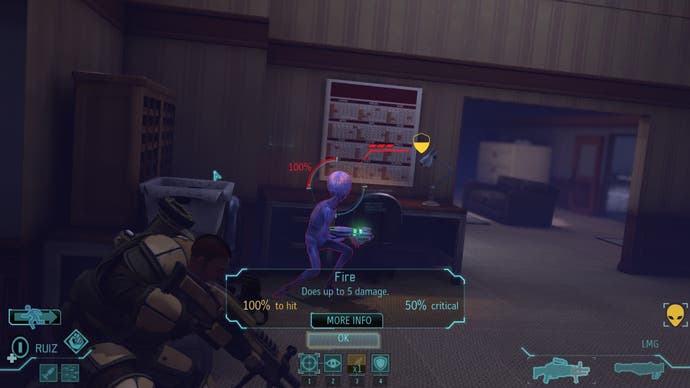
Not least because death is an inconvenience. Soldiers level up over time, as they did in the original, along a neatly worked out set of classes with branching ability paths. Abilities work on cooldowns and range from letting Assault troops shoot after dashing to giving snipers grenade-like scanners or multiple shots in a turn. The little boosts pile up with rank, meaning experienced squad members are so much more capable than new recruits that losing them - or anyone, really - weakens XCOM for much more than one mission. Later in the game, barracks upgrades plus generally better equipment can soften the blow of losing a veteran, but it always hurts. God speed Marco 'D.O.A.' Bettini and your 71 kills.
These abilities are perfectly pitched against the innate skills of the aliens, a pack of situational gambits seen at their fullest in multiplayer. Both players get the same amount of credits to spend on a team, and then buy and customise pre-packaged versions of the campaign units. You can go in with one Ethereal and a couple of heavies, running distraction while turning the other team against itself, or go in with three Sectoids mind-merged with three snipers for a crit-heavy glass cannon. The psychic abilities in particular, which only appear near the end of the solo campaign, find their true home here: making a buddy's grunts panic never gets old. The mode feels a little lightweight, because despite ranked matches there's no real long-term structure, but that shouldn't overshadow the fact that it allows for fantastic matches.
XCOM's focus is on single-player, though, and rightly so. One of the best surprises is the scriptwriting (by one Scott Wittbecker): a snappy mixture of military designations, sci-fi jargon and salty battle dialogue. The substantial campaign is challenging enough on Normal, with a big leap in enemy threat and movement on Classic - both of which are enhanced immeasurably by Ironman mode, which removes the temptation to save-cheat. The last difficulty level, Impossible, is aptly named.
"This game is a winner. So much craft has gone into its atmosphere, into innumerable small details that together add enormous depth and flavour to the world."
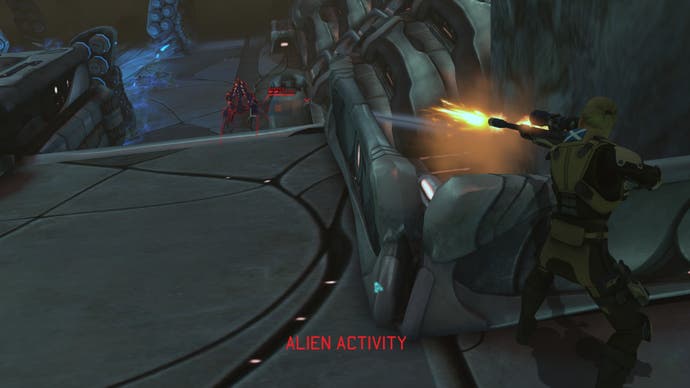
This game is a winner. So much craft has gone into its atmosphere, into innumerable small details that together add enormous depth and flavour to the world: the occasional conversations overheard while fiddling around in the base; the mission loading screen, which gives you a view of the troops inside the carrier, fidgeting and tapping their feet in transit; the ridiculously cute touch of soldiers acquiring nicknames like 'Longshot' or 'Odin' after a few missions; the memorial room for fallen warriors, with a cork board of photos on the wall, which records their names - and the fact that visiting it triggers, after a few seconds, the sound of a bagpipe march.
Near the campaign's end, there's a direct tribute to the original game's designers, the Gollop brothers, accompanied by an achievement called 'On the Shoulders of Giants'. It's a beautiful touch, a nod from one development team to another across the generations. They have something in common now. In their own time and place, each made a fantastic game called XCOM.
